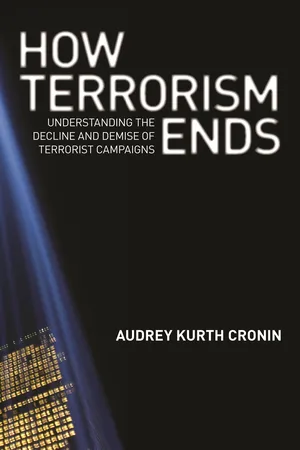
How Terrorism Ends
Understanding the Decline and Demise of Terrorist Campaigns
- 336 pages
- English
- ePUB (mobile friendly)
- Available on iOS & Android
About this book
“A landmark study."—Robin Wright, The New Yorker
Why every terrorist movement comes to an end—and how this history can help us combat today's terrorist threats
Amid the fear following 9/11 and more recent terror attacks, it is easy to forget the most important fact about terrorist campaigns: they always come to an end—and often far more quickly than expected. Contrary to what many assume, when it comes to dealing with terrorism it may be more important to understand how it ends than how it begins. Only by understanding the common ways in which terrorist movements have died out or been eradicated in the past can we hope to figure out how to speed the decline of today's terrorist groups, while avoiding unnecessary fears and costly overreactions. In How Terrorism Ends, Audrey Kurth Cronin examines how terrorist campaigns have met their demise over the past two centuries, and applies these enduring lessons to outline a new strategy against al-Qaeda.
This book answers questions such as: How long do terrorist campaigns last? When does targeting the leadership finish a group? When do negotiations lead to the end? Under what conditions do groups transition to other forms of violence, such as insurgency or civil war? How and when do they succeed or fail, and then disappear? Examining a wide range of historical examples—including the anti-tsarist Narodnaya Volya, the Provisional IRA, Peru's Shining Path, Japan's Aum Shinrikyo, and various Palestinian groups—Cronin identifies the ways in which almost all terrorist groups die out, including decapitation (catching or killing the leader), negotiation, repression, and implosion.
How Terrorism Ends is the only comprehensive book on its subject and a rarity among all the books on terrorism—at once practical, optimistic, rigorous, and historical.
Frequently asked questions
- Essential is ideal for learners and professionals who enjoy exploring a wide range of subjects. Access the Essential Library with 800,000+ trusted titles and best-sellers across business, personal growth, and the humanities. Includes unlimited reading time and Standard Read Aloud voice.
- Complete: Perfect for advanced learners and researchers needing full, unrestricted access. Unlock 1.4M+ books across hundreds of subjects, including academic and specialized titles. The Complete Plan also includes advanced features like Premium Read Aloud and Research Assistant.
Please note we cannot support devices running on iOS 13 and Android 7 or earlier. Learn more about using the app.
Information
Table of contents
- Cover
- Title
- Copyright
- Dedication
- Contents
- Acknowledgments
- Abbreviations
- Introduction
- Chapter One Decapitation: Catching or Killing the Leader
- Chapter Two Negotiations: Transition toward a Legitimate Political Process
- Chapter Three Success: Achieving the Objective
- Chapter Fout Failure: Imploding, Provoking a Backlash, or Becoming Marginalized
- Chapter Five Repression: Crushing Terrorism with Force
- Chapter Six Reorientation: Transitioning to Another Modus Operandi
- Chapter Seven How Al-Qaeda Ends: The Relevance and Irrelevance of History
- Conclusion
- Appendix: Statistical Analysis of Terrorist Campaigns
- Notes
- Selected Bibliography
- Index